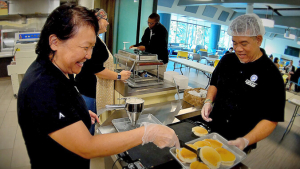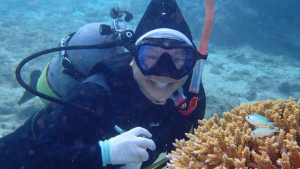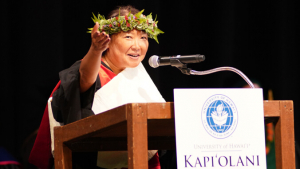When Misaki Takabayashi started as Kapiʻolani Community College’s new chancellor in March, she quickly learned that students’ No.1 concern was basic needs—specifically skipping a meal almost daily. “Pōʻalua (Tuesday) Pancakes” was born.
“Every Tuesday morning, this year at least, we will be serving free pancakes to students in our beautiful cafeteria,” Takabayashi said. “At the same time, we’ll be hosting and displaying all the resources that are available to students.”

While scoring a free breakfast, the students are also able to easily access information about scholarship and internship opportunities, basic needs support programs and more.
“We’re giving students not just physical food sustenance but other resources and tools to succeed while they’re here and beyond,” she said.
Kapiʻolani CC’s Culinary Institute of the Pacific and Student Congress are also collaborators in Pōʻalua Pancakes.
Building the hale

Takabayashi said student success is the bottom line by which Kapiʻolani CC leadership will make decisions. It’s all part of the vision for the campus, being developed in the next strategic plan, which she likens to a 3D architectural rendering of a house.
The foundation of the modern, open-air structure with no rooms and walls is Hawaiʻi and its Native Hawaiian host culture.
No surprise for a campus with a well-known culinary arts program—this house has a lovely, big kitchen.
“We’re cooking with two ingredients—student success and a thriving, sustainable campus,” Takabayashi explained. “We cook those and then the dish we provide is workforce capacity building. So we’re sending our students away with the skills and tools to be part of increasing the workforce capacity of the state and beyond.”
From Japan to Australia to Hawaiʻi

Takabayashi grew up as a child in Japan and Australia. She is a marine scientist, specializing in coral reef molecular ecology and earned a doctorate of philosophy in marine science from the University of Queensland, Australia and a master of science in biology and bachelor of science in biology from the University of Sydney, Australia.
She said she “grew up” as an adult and educator at the University of Hawaiʻi at Hilo, serving as interim associate vice chancellor for academic affairs, associate dean for college of arts and sciences, department chair for marine science and a researcher. During her tenure at UH Hilo, she also learned to speak Hawaiian, and earned an associate of applied science in Hawaiian studies from Hawaiʻi Community College.
She credits UH Hilo’s Uluākea (PDF) faculty development program with her growth there.
“They empowered us and gave us tools to have authentic experiences with Hawaiʻi—visiting places or experiencing things ourselves that we could teach our discipline through some of the lenses of the land and of the place,” she recalled. “As a scientist, I learned so much about the ocean of a place just by the (Hawaiian) name of that particular place.”
Looking forward and outward

Her last post before Kapiʻolani CC was as associate vice president/vice dean of graduate school, Okinawa Institute of Science and Technology Graduate University, Japan.
The ability to move quickly and nimbly attracted her to serve at a community college, as did the location in Hawaiʻi.
“The world comes to Hawaiʻi, and Hawaiʻi is really the center of the Pacific, not just geographically but in terms of international relations with the Asia Pacific and commercial or governmental relationships, we play a critical role in supplying global talent,” Takabayashi said.
The college and its partners aim to send more students, faculty and staff overseas for “transformative experiences,” and to become more globally aware.
She said it is an opportune moment in time when resources, opportunities and demands are converging.
Takabayashi said, “Ultimately the whole point is—it’s good for the graduates, getting a good job or creating a good job for themselves, but really the whole thing is to enhance the workforce capacity of the community. It’s really exciting!”

